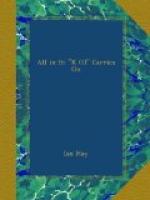In due course Battalion Orders were issued and approved. They dealt with operations most barbarous amid localities of the most homelike sound. Number Nine Platoon, for instance (Commander Lieutenant Cockerell), were to proceed in single file, carrying so many grenades per man, up Charing Cross Road, until stopped by the barrier which the enemy were understood to have erected in Trafalgar Square, where a bombing-post and at least one machine-gun would probably be encountered. At this point they were to wait until Trafalgar Square had been suitably dealt with by a trench-mortar. (Here followed a paragraph addressed exclusively to the Trench-Mortar Officer.) After this the bombers of Number Three Platoon would bomb their way across the Square and up the Strand. Another party would clear Northumberland Avenue, while a Lewis gun raked Whitehall. And so on. Every detail was thought out, down to the composition of the parties which were to “clean up” afterwards—that is, extract the reluctant Boche from various underground fastnesses well known to the extractors. The whole enterprise was then thoroughly rehearsed in some dummy trenches behind the line, until every one knew his exact part. Such is modern warfare.
Next day the Kidney Bean Redoubt was in British hands again. The Hun—what was left of him after an intensive bombardment of twenty-four hours—had betaken himself back over the ridge, via the remnants of his two new communication trenches, to his original front line. The two communication trenches themselves were blocked and sandbagged, and were being heavily supervised by a pair of British machine-guns. Fighting in the Redoubt itself had almost ceased, though a humorous sergeant, followed by acolytes bearing bombs, was still “combing out” certain residential districts in the centre of the maze. Ever and anon he would stoop down at the entrance of some deep dug-out, and bawl—
“Ony mair doon there? Come away, Fritz! I’ll gie ye five seconds. Yin, Twa, Three—”
Then, with a rush like a bolt of rabbits, two or three close-cropped, grimy Huns would scuttle up from below and project themselves from one of the exits; to be taken in charge by grinning Caledonians wearing “tin hats” very much awry, and escorted back through the barrage to the “prisoners’ base” in rear.
All through the day, amidst unremitting shell fire and local counter-attack, the Hairy Jocks reconsolidated the Kidney Bean; and they were so far successful that when they handed over the work to another battalion at dusk, the parapet was restored, the machine-guns were in position, and a number of “knife-rest” barbed-wire entanglements were lying just behind the trench, ready to be hoisted over the parapet and joined together in a continuous defensive line as soon as the night was sufficiently dark.
One by one the members of Number Nine Platoon squelched—for it had rained hard all day—back to the reserve line. They were utterly exhausted, and still inclined to feel a little aggrieved at having been pulled out from rest; but they were well content. They had done the State some service, and they knew it; and they knew that the higher powers knew it too. There would be some very flattering reading in Divisional Orders in a few days’ time.




